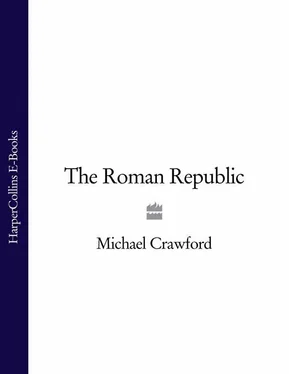Michael Crawford - The Roman Republic
Здесь есть возможность читать онлайн «Michael Crawford - The Roman Republic» — ознакомительный отрывок электронной книги совершенно бесплатно, а после прочтения отрывка купить полную версию. В некоторых случаях можно слушать аудио, скачать через торрент в формате fb2 и присутствует краткое содержание. Жанр: unrecognised, на английском языке. Описание произведения, (предисловие) а так же отзывы посетителей доступны на портале библиотеки ЛибКат.
- Название:The Roman Republic
- Автор:
- Жанр:
- Год:неизвестен
- ISBN:нет данных
- Рейтинг книги:4 / 5. Голосов: 1
-
Избранное:Добавить в избранное
- Отзывы:
-
Ваша оценка:
- 80
- 1
- 2
- 3
- 4
- 5
The Roman Republic: краткое содержание, описание и аннотация
Предлагаем к чтению аннотацию, описание, краткое содержание или предисловие (зависит от того, что написал сам автор книги «The Roman Republic»). Если вы не нашли необходимую информацию о книге — напишите в комментариях, мы постараемся отыскать её.
The Roman Republic — читать онлайн ознакомительный отрывок
Ниже представлен текст книги, разбитый по страницам. Система сохранения места последней прочитанной страницы, позволяет с удобством читать онлайн бесплатно книгу «The Roman Republic», без необходимости каждый раз заново искать на чём Вы остановились. Поставьте закладку, и сможете в любой момент перейти на страницу, на которой закончили чтение.
Интервал:
Закладка:
The ambassadors, having received this answer, departed, and after a few days returned, not merely with words alone, but bringing the insignia of sovereignty with which they used to decorate their own kings. These were a crown of gold, an ivory throne, a sceptre with an eagle perched on its head, a purple tunic decorated with gold, and an embroidered purple robe like those the kings of Lydia and Persia used to wear, except that it was not rectangular in shape like theirs, but semicircular. This kind of robe is called toga by the Romans and tebenna by the Greeks; but I do not know where the Greeks learned the name, for it does not seem to me to be a Greek word. And according to some historians they also brought (back to Rome) the twelve axes, taking one from each city. For it seems to have been a Tyrrhenian custom for each king of the several cities to be preceded by a lictor bearing an axe together with the bundle of rods (the fasces ), and, whenever the twelves cities undertook any joint military expedition, for the twelve axes to be handed over to the one man who held supreme command (Dionysius of Halicarnassus, III, 61, using the results of Roman antiquarian research;).
More fundamentally, the Capitoline Triad of Jupiter, Juno and Minerva is of Etruscan origin; the Roman system of nomenclature, however, personal name (as Marcus), name of gens , or large family group (as Tullius) and cognomen , or family name (as Cicero), is Italic rather than Etruscan in origin.
The Etruscan empire in Campania was destroyed by the Samnites (see above), the empire in the Po valley by the Gauls. Etruria itself was progressively subjugated by Rome, much aided by the fragility of Etruscan social structures; the lower orders are described by Dionysius in connection with a campaign of 480 as penestai , the word used to describe the serf population of Thessaly in Greece. In return for support against the lower orders, the governing classes were only too happy to accept Roman overlordship, as at Arretium in 302 and Volsinii in 264. It was a technique that Rome never forgot.
III The Roman Governing Classes
DOWN TO 510, Rome was ruled by kings. The monarchy was in some sense elective, though the descent of a candidate from an earlier king was not an irrelevant consideration; the office of interrex , the man who presided over an interregnum and the emergence of a successor, survived the end of the monarchy with its name unchanged and its function essentially the same, to preside over a hiatus between duly elected officials of the community.
The essence of the transition from kings to pairs of officials (called by the Romans magistratus , magistrates) holding office for a year is encapsulated by Livy (11, 1, 7–8), following the common opinion of his day; the truth, if different, is irrecoverable:
One can regard the cause of freedom as lying rather in the fact that consular imperium was made annual than in any diminution in the regal power (inherited by the consuls); the first consuls retained all the rights and insignia (of the king); the only precaution taken was that they should not both hold the fasces simultaneously and thereby create a double impression of fearfulness. Brutus was the first to hold the fasces (for the first month), with the agreement of his colleague.
Two consuls instead of a king now stood each year at the head of the community; the assembly of adult males which elected them remaind the same, 1 as did the body of elders who advised them; this was the senate, composed in practice of former magistrates. Time and circumstance produced various modifications in the three elements whose interplay was the Roman political system, including notably the creation of a large number of lesser magistrates ( see hereand here); nothing altered the central fact of Republican government, that it was the collective rule of an aristocracy, in principle and to a varying extent in practice dependent on the will of a popular assembly. This aristocracy was in one sense self-perpetuating, but it was of course one from which many families disappeared over the centuries and to which new families were admitted, while an inner core of great families persisted (see Pl.8).
It was a form of government to which modern notions of being in or out of power are almost wholly inappropriate; a particular individual held office only at rare intervals and with one unimportant exception (for the dictatorship, see hereand here) always as a member of a college of magistrates whose powers were equal. But increasing age, if coupled with a growing reputation for practical wisdom, brought with it increasing influence in the deliberations of the ruling elite. The voice of a few powerful men was often decisive.
At the same time, competition within this elite was fierce, for a consulship or other magistracy and for the recognition of primacy in practical wisdom; given the succession of wars in which Rome was involved, it is not surprising that success as a consul regularly involved victory in battle, rewarded with a triumph ( see here); primacy in practical wisdom was rewarded with the title of princeps senatus , leader of the deliberative body of the Roman state.
Aristocratic attitudes to the political process emerge not only from the inscriptions on the tombs of the Scipios ( see here), but also from the record of the victory of C. Duilius over the Carthaginians in 260:
As consul he relieved the Segestans, allies of the Roman people, from the Carthaginian siege and nine days later drove the Carthaginian troops and their commanders from their camp in broad daylight and took the town of Macela by assault. And in the same magistracy as consul he for the first time had success with a fleet at sea and for the first time prepared and equipped naval forces and a fleet and with these ships defeated in battle on the high sea all the Punic fleet, including large Carthaginian forces in the presence of Hannibal their commander, and took by force with his allies 1 septireme and 30 quinqueremes and triremes. (A list of booty follows). At his naval triumph he presented the people with the booty and led many free Carthaginians (captives in the triumph) before his chariot … ( ILLRP 319)
The history of Republican government is to a large extent the history of competition within a group of men formally peers, always within the framework of the overriding decisions of the group; the ideology of collective rule in the middle and late Republic was powerfully reinforced by stories, improving whether true or false, of the fate suffered by men who in the early Republic stepped out of line:
(Sp. Maelius had distributed corn from his own resources; emergency measures were taken to deal with the threat posed by his ambition; these measures involved the appointment of a dictator and a master of horse as his deputy, in office for six months with supreme power overriding that of the consuls.) C. Servilius Ahala as master of horse was sent by the dictator to Maelius and said ‘The dictator summons you.’ When Maelius fearfully asked what he wanted, and Servilius replied that he had to stand trial and disprove before the senate the charge laid by L. Minucius, Maelius began to retreat into his band of followers … Servilius followed him and cut him down; covered with the blood of the dead man and surrounded by a band of young patricians, he announced to the dictator that Maelius had been summoned to him, but had fought off the attendant (who had tried to arrest him) and had incited the mob, and had received his deserts. The dictator replied ‘Bravely done, C. Servilius, for freeing the res publica (from the threat of a tyrant)’ (Livy IV, 13–14).
Within the Roman community, a closed group of families, knows as patricians, had been defined already under the monarchy by a process which is now unknowable. The group succeeded after the overthrow of the monarchy in substantially monopolizing the tenure of magistracies and priesthoods alike; as a result patricians also largely filled the senate. Wealthy and ambitious families of plebeians mostly excluded from the processes of government were naturally anxious to be admitted; at the same time the poorer plebeians were anxious to reduce or eliminate the economic exploitation to which they were subjected. The two groups of dissidents combined to extort concessions, the breaking of the monopoly of office by the patricians and the alleviation of the harsh laws of debt (under these a peasant who could not pay off a loan, perhaps of seed corn from a wealthy neighbour, could be reduced to slavery). In the process, the plebs acquired its own assembly and legislative organ, the concilium plebis (Appendix 1), and its own officials, the tribunes, whose chief function was to protect citizens from arbitrary action by a magistrate. At some time they acquired the important right to veto any action by a magistrate or the senate. They were sacrosanct, protected by an oath of the plebs to kill anyone who killed a tribune.
Читать дальшеИнтервал:
Закладка:
Похожие книги на «The Roman Republic»
Представляем Вашему вниманию похожие книги на «The Roman Republic» списком для выбора. Мы отобрали схожую по названию и смыслу литературу в надежде предоставить читателям больше вариантов отыскать новые, интересные, ещё непрочитанные произведения.
Обсуждение, отзывы о книге «The Roman Republic» и просто собственные мнения читателей. Оставьте ваши комментарии, напишите, что Вы думаете о произведении, его смысле или главных героях. Укажите что конкретно понравилось, а что нет, и почему Вы так считаете.












